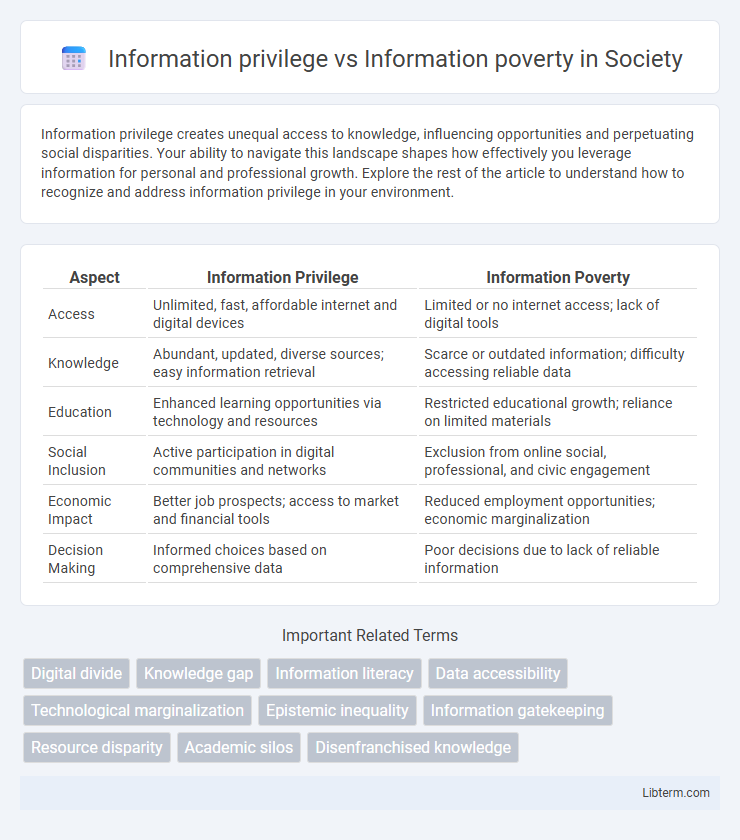Information privilege creates unequal access to knowledge, influencing opportunities and perpetuating social disparities. Your ability to navigate this landscape shapes how effectively you leverage information for personal and professional growth. Explore the rest of the article to understand how to recognize and address information privilege in your environment.
Table of Comparison
| Aspect | Information Privilege | Information Poverty |
|---|---|---|
| Access | Unlimited, fast, affordable internet and digital devices | Limited or no internet access; lack of digital tools |
| Knowledge | Abundant, updated, diverse sources; easy information retrieval | Scarce or outdated information; difficulty accessing reliable data |
| Education | Enhanced learning opportunities via technology and resources | Restricted educational growth; reliance on limited materials |
| Social Inclusion | Active participation in digital communities and networks | Exclusion from online social, professional, and civic engagement |
| Economic Impact | Better job prospects; access to market and financial tools | Reduced employment opportunities; economic marginalization |
| Decision Making | Informed choices based on comprehensive data | Poor decisions due to lack of reliable information |
Understanding Information Privilege
Information privilege refers to the unequal access to data, knowledge, and digital resources that enables certain individuals or communities to gain economic, social, and educational advantages. Understanding information privilege involves recognizing how disparities in access to technology, high-speed internet, and digital literacy create significant barriers for marginalized groups, perpetuating cycles of information poverty. Addressing this imbalance requires targeted efforts to improve digital infrastructure, enhance educational opportunities, and promote equitable information dissemination.
Defining Information Poverty
Information poverty refers to the lack of access to essential information resources, technologies, and skills necessary to participate fully in societal, economic, and educational activities. It results in significant disparities in knowledge acquisition, digital literacy, and opportunities for personal and community development. Addressing information poverty is crucial for bridging the digital divide and promoting equitable information access worldwide.
Historical Roots of Information Inequality
Historical roots of information inequality trace back to the development of printing technology and unequal access to educational resources, which created early divides between information privilege and information poverty. Colonization and systemic socioeconomic disparities further entrenched these gaps by limiting marginalized communities' access to knowledge and communication channels. Digital divides in the modern era have perpetuated these historical patterns, highlighting the ongoing struggle to achieve equitable information access globally.
Digital Divide: Access and Barriers
Information privilege highlights the advantages held by individuals with seamless access to digital technologies, high-speed internet, and digital literacy skills, enabling efficient information retrieval and communication. In contrast, information poverty reflects the challenges faced by those lacking access due to economic, geographic, or infrastructural barriers, intensifying the digital divide. This divide perpetuates inequalities in education, employment, and civic participation by restricting marginalized communities' opportunities to leverage digital resources.
Societal Impacts of Information Disparities
Information privilege creates unequal access to critical resources like education, healthcare, and economic opportunities, intensifying existing social inequalities. Information poverty limits individuals' ability to participate in democratic processes and hinders their social mobility, reinforcing cycles of marginalization. Societal impacts of these disparities include reduced social cohesion, lower economic growth, and increased polarization within communities.
The Role of Libraries and Public Institutions
Libraries and public institutions mitigate information privilege by providing equitable access to digital resources, educational programs, and research tools that combat information poverty. These entities foster digital literacy and critical thinking skills, enabling underserved communities to engage with accurate and diverse information. By bridging the information divide, libraries empower individuals to participate fully in civic, educational, and economic opportunities.
Technology as a Bridge or Barrier
Information privilege enables individuals with access to advanced technology and digital resources to benefit from vast knowledge and opportunities, enhancing education and economic prospects. In contrast, information poverty arises when lack of access to internet connectivity, devices, and digital literacy creates barriers that reinforce social and economic inequalities. Technology serves as a critical bridge when infrastructures like broadband networks and affordable devices are available, but it becomes a barrier in regions or communities where these technological resources are scarce or inaccessible.
Education and Information Literacy
Information privilege enables individuals to access diverse educational resources and develop critical information literacy skills, fostering academic success and lifelong learning. In contrast, information poverty limits exposure to quality educational content, hindering the ability to evaluate and use information effectively, which perpetuates educational disparities. Bridging this gap requires targeted interventions to improve access to digital tools and promote inclusive information literacy programs.
Policy Solutions to Reduce Information Gaps
Policy solutions to reduce information gaps focus on expanding equitable access to digital infrastructure, such as affordable broadband internet and public Wi-Fi in underserved areas. Government initiatives that promote digital literacy programs empower marginalized communities to effectively utilize information resources. Implementing open data policies and supporting community information hubs further bridge the divide between information privilege and information poverty.
Building an Equitable Information Society
Information privilege enables individuals with access to advanced technology, digital literacy, and robust networks to participate fully in the information society, while information poverty restricts marginalized groups from these opportunities, perpetuating social inequalities. Bridging this gap requires equitable investment in digital infrastructure, inclusive education programs, and policies that ensure affordable access to information resources for all communities. Fostering an equitable information society enhances social inclusion, economic development, and democratic participation by empowering underserved populations with the knowledge and tools necessary for meaningful engagement.
Information privilege Infographic

 libterm.com
libterm.com